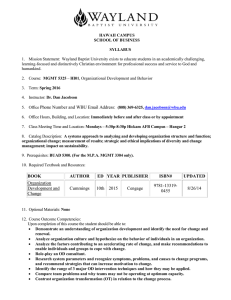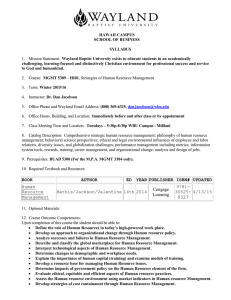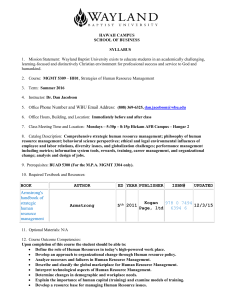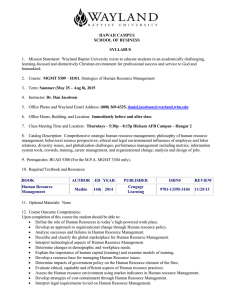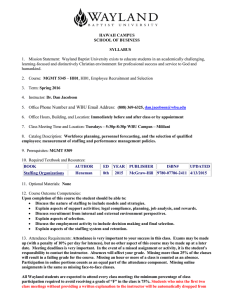Wayland Baptist University, Hawai’i Campus, School of Education
advertisement
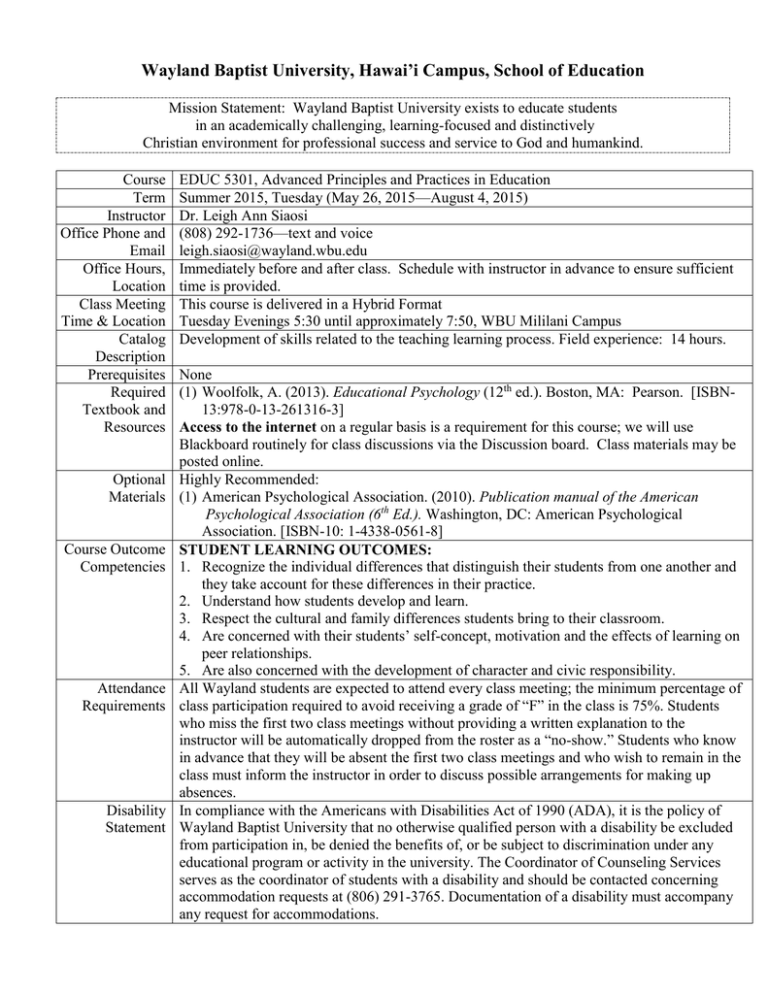
Wayland Baptist University, Hawai’i Campus, School of Education Mission Statement: Wayland Baptist University exists to educate students in an academically challenging, learning-focused and distinctively Christian environment for professional success and service to God and humankind. Course Term Instructor Office Phone and Email Office Hours, Location Class Meeting Time & Location Catalog Description Prerequisites Required Textbook and Resources Optional Materials Course Outcome Competencies Attendance Requirements Disability Statement EDUC 5301, Advanced Principles and Practices in Education Summer 2015, Tuesday (May 26, 2015—August 4, 2015) Dr. Leigh Ann Siaosi (808) 292-1736—text and voice leigh.siaosi@wayland.wbu.edu Immediately before and after class. Schedule with instructor in advance to ensure sufficient time is provided. This course is delivered in a Hybrid Format Tuesday Evenings 5:30 until approximately 7:50, WBU Mililani Campus Development of skills related to the teaching learning process. Field experience: 14 hours. None (1) Woolfolk, A. (2013). Educational Psychology (12th ed.). Boston, MA: Pearson. [ISBN13:978-0-13-261316-3] Access to the internet on a regular basis is a requirement for this course; we will use Blackboard routinely for class discussions via the Discussion board. Class materials may be posted online. Highly Recommended: (1) American Psychological Association. (2010). Publication manual of the American Psychological Association (6th Ed.). Washington, DC: American Psychological Association. [ISBN-10: 1-4338-0561-8] STUDENT LEARNING OUTCOMES: 1. Recognize the individual differences that distinguish their students from one another and they take account for these differences in their practice. 2. Understand how students develop and learn. 3. Respect the cultural and family differences students bring to their classroom. 4. Are concerned with their students’ self-concept, motivation and the effects of learning on peer relationships. 5. Are also concerned with the development of character and civic responsibility. All Wayland students are expected to attend every class meeting; the minimum percentage of class participation required to avoid receiving a grade of “F” in the class is 75%. Students who miss the first two class meetings without providing a written explanation to the instructor will be automatically dropped from the roster as a “no-show.” Students who know in advance that they will be absent the first two class meetings and who wish to remain in the class must inform the instructor in order to discuss possible arrangements for making up absences. In compliance with the Americans with Disabilities Act of 1990 (ADA), it is the policy of Wayland Baptist University that no otherwise qualified person with a disability be excluded from participation in, be denied the benefits of, or be subject to discrimination under any educational program or activity in the university. The Coordinator of Counseling Services serves as the coordinator of students with a disability and should be contacted concerning accommodation requests at (806) 291-3765. Documentation of a disability must accompany any request for accommodations. Course Requirements and Grading Criteria: The University classroom is an environment designed for the free exchange of ideas, therefore demonstrating respect toward each other is vital to creating rich discussions that draw from research and data to further our knowledge in this field. We will show respect for one another by exhibiting civility in our exchanges. In the education field, communicating ideas to colleagues, parents, and administrators with clear and error-free English is a priority. Your ability to express your knowledge of educational concepts and theories within the conventions of academic discourse will be assessed through presentations and written assignments. Integration of information from lectures, readings, and discussions will be taken into consideration as will correct and appropriate format and construction. 1. Students will complete all assigned readings and assignments by the due date. 2. Students will prepare various presentations to include presentations for lesson plans, case studies, lesson modeling, and field experience. 3. Students will prepare written assignments to include journal writing of their field experience and lesson plans. All assignments must be word processed using Times New Roman, 12-point font, and submitted in accordance with due dates on the course calendar. 4. Online discussion board interactions will allow dialogue among class members and provide opportunities for discussion among those persons who may exhibit a different perspective from your own. You are required to consider these perspectives and respond in an appropriate professional manner with reasoned arguments. Avoid emotional responses such as ‘I feel,’ but rather refer to the evidence to support your position. Students will post an answer to the question or comment and respond to two (2) other posts. These discussions are meant to broaden our perspectives and make informed decisions based upon research-based best practices. There will be no tolerance for inappropriate responses including, but not limited to, vulgar or inappropriate language, name-calling, or demonstrations of anger. We will learn from each other in a safe and professional environment. Deconstruction of Journal Articles and Presentation (3 articles) Students will examine and report on three research studies relevant to one of the weekly topi. These journal articles are not the same articles used for the annotated bibliography. There are three parts to the deconstruction: 1. Identification of author’s work with APA citation, 2. Summary of the main points of the article, and the majority of the paper is 3. Analysis and evaluation to look at the strengths and weaknesses of the article. Reports are to be 2-3 pages in length, double-spaced. Accompanying the written critique will be an oral presentation (using PowerPoint or prezi) between 5-10 minutes in duration for Journal article #1. For Journal Article #2, the report and discussion board questions/presentation will be done via BlackBoard Colleagues to provide feedback. Field Experience/Journal/Presentation As part of the requirements for this course, students will complete 14 hours of direct and active involvement with students, and that involvement must be linked to course content. Students will document field experience in a journal (5-page double-spaced). It is recommended that the field experience journals be kept in electronic form. The journal will be submitted to the instructor and graded, and the grade will be included in your course grade. Successful completion of the field experience hours is required to receive credit for the course. *To protect the subjects of the field experience, names of teachers/students should be omitted in journal entries and presentations. Students will present their field experience highlights in weeks 10 or 11. The 20-30 minute presentation should incorporate the following: Presentation slides (PowerPoint or prezi) Highlights of the experience to include: any surprises, wonderings, concerns, what ifs, lessons learned, etc. Journal entry highlights Reflections—what are the personal lessons learned from completing these field experiences? How do(would) these lessons affect your teaching? BlackBoard Article Presentations and Interactions Students will participate in dialogue with colleagues via BlackBoard. You will be expected to post an original answer to each discussion board topic or question and respond to colleagues’ answers. Articles should be posted by Saturday morning of each week, allowing enough time for colleagues to add their “Two Stars and a Wonder.” Each week students will provide feedback to colleagues on the Article Topic assigned each week, utilizing the “Two Stars and a Wonder” protocol. Two Stars: provide positive comments for two features of the article that you appreciate Wonder: a question, suggestion, or comment you have regarding the article. Facilitation of Chapter Reading Discussions Students will present to colleagues chapter highlights from three chapters in Woolfolk’s text, facilitating a class discussion (face-to-face). Colleagues are expected each week to participate in the discussion in class. Any presentation items and handouts should be posted on BlackBoard for colleagues. Sign ups for chapter presentations will occur at the first class meeting. Presentations are not meant to “teach” the material as the audience has already read the material, but should highlight key concepts and engage the class in a discussion/activity around the material in order to deepen everyone’s knowledge. The timeframe for the presentation/discussion is 15-30 min per chapter. Student Grade Appeal Students shall have protection through orderly procedures against prejudices or capricious academic evaluation. A student who believes that he or she has not been held to realistic academic standards, just evaluation procedures, or appropriate grading, may appeal the final grade given in the course by using the student grade appeal process described in the Academic Catalog. Appeals may not be made for advanced placement examinations or course bypass examinations. Appeals are limited to the final course grade, which may be upheld, raised, or lowered at any stage of the appeal process. Any recommendation to lower a course grade must be submitted through the Executive Vice President/Provost to the Faculty Assembly Grade Appeals Committee may instruct that the course grade be upheld, raised, or lowered to a more proper evaluation. Week/Date Week 1 5/26/15 Week 2 6/2/15 Week 3 6/9/15 Week 4 6/16/15 Week 5 6/23/15 Week 6 6/30/15 Week 7 7/7/15 Week 8 7/14/15 Week 9 7/21/15 Week 10 7/28/15 Week 11 8/4/15 TENTATIVE COURSE OUTLINE Topic Activities & Discussions Readings & Assignments due the following week Review of Syllabus and Assignments Read: Chapter 1 Post on BlackBoard an Article on “What is Good Teaching?” Complete 2 Stars & a Wonder Chap. 1 Presentation & Discussion Read: Chapters 2-3 Discuss “What is Good Teaching?” Post on BlackBoard an Article on “Student Self-Concept/Self-Esteem” Complete 2 Stars & a Wonder Chapters 2 & 3 Presentation & Discussion Read: Chapters 4-5 Discuss “Student Self-Concept/Self-Esteem” Post on BlackBoard an Article on “Teaching Diverse Learners” Complete 2 Stars & a Wonder Chapters 4 & 5 Presentation & Discussion Read: Chapters 6-7 Discuss “Teaching Diverse Learners” Post on BlackBoard an Article on “Multiculturalism in the Classroom” Complete 2 Stars & a Wonder Chapters 6 & 7 Presentation & Discussion Read: Chapter 8 Discuss “Multiculturalism in the Classroom” Post on BlackBoard an Article on “Learning and the Brain” Complete 2 Stars & a Wonder Chapter 8 Presentation & Discussion Read: Chapters 9-10 Discuss “Learning and the Brain” Post on BlackBoard an Article on “Developing Critical Thinking in Students” Complete 2 Stars & a Wonder Chapters 9 & 10 Presentation & Discussion Read: Chapter 11 Discuss “Developing Critical Thinking in Post on BlackBoard an Article on Students” “Motivating Students to Learn” Complete 2 Stars & a Wonder Chapter 11 Presentation & Discussion Read: Chapters 12-13 Discuss “Motivating Students to Learn” Post on BlackBoard an Article on “Dealing with difficult students” Complete 2 Stars & a Wonder Chapters 12 & 13 Presentation & Discussion Read: Chapter 14 Discuss “Dealing with difficult students” Journal Deconstructions (due 7/28/15) Chapter 14 Presentation & Discussion Read: Chapter 15 Journal Deconstruction Presentations Field Experience Journal (due 8/4/15) Chapters 15 Presentation & Discussion Field Experience Presentations GRADING CRITERIA Activity Possible Points Participation/Discussion Board (10 pts/Wk) 110 Journal Deconstruction (3 articles-40 pts. each) 120 Chapter Presentations—3@ 20 pts.each 60 Weekly Article Posts & Discussion (8 @ 10 pts. Each) 80 Field Experience Journal 14 hours (5 pgs.) 50 Field Experience Presentation 40 Journal Deconstruction Presentation 40 TOTAL POINTS 500 GRADING SCALE: A 450-500 points B 400-449 points C 350-399 points D F 300-349 points Below 300 points I W WP WF Incomplete Approved Withdrawal Approved Withdrawal Passing Withdrawal Failing The syllabus is only a plan. The instructor may modify the plan during the course to alter requirements from those appearing in the syllabus. Further the syllabus contains criteria to measure the student’s progress and performance in the course. The instructor may change these criteria at any time. Other Important Information: 1. Class participation is a very important part of education. This class requires active class participation. 2. Assignments are due on the deadlines given. 3. Late assignments will not be accepted. 4. Written work will be graded according to the rubrics provided. 5. All written assignments should be Times New Roman 12-point font type, double-spaced and using APA Manuscript Writing Style, unless otherwise noted. 6. Presentations will be graded according to the rubrics provided. 7. Unless noted as a group assignment, all work should be original work of the individual student. 8. Academic honesty is expected of all students. Plagiarism, cheating, and other acts that lack academic honesty may result in a zero on the particular assignment as well as a referral to the Dean for disciplinary action. 9. Questions concerning grades received should be resolved within one week after the assignment has been returned. 10. Students will need to use the Internet to access some assignments. 11. Always contact the professor if you need assistance. 12. May God Bless You
